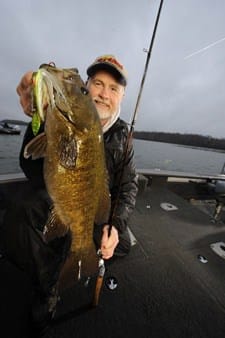 If it’s not snow or freezing rain, it’s bone-chilling air temperatures and icy winds that make a day on the water nearly insufferable. But just because you’re uncomfortable, it doesn’t mean that the bass are. Sure, it’s December, it’s cold outside and I’m sure you still have some holiday shopping to do, but bass are still in the lake. If they want to make it through the winter they will have to eat.
If it’s not snow or freezing rain, it’s bone-chilling air temperatures and icy winds that make a day on the water nearly insufferable. But just because you’re uncomfortable, it doesn’t mean that the bass are. Sure, it’s December, it’s cold outside and I’m sure you still have some holiday shopping to do, but bass are still in the lake. If they want to make it through the winter they will have to eat.
As the water temperature drops, bass follow the migrating shad out to deeper water (deep being anywhere from 30 to 40 feet in clear, deep lakes or six to eight feet in murky, shallow ones). Use your electronics and find the balls of shad. There’s sure to be some bass nearby, holding up in vertical, deep cover. Typically, bass will be easier to find down lake on outside channel swings, bluff faces and points with vertical drops.
Since bass are cold blooded, the colder water has slowed them down – so you should slow down, too. This ties in directly to your bait selection, the most important aspect to catching bass in the cold. Just because the bass are following migrating shad that doesn’t mean that’s all they will eat. Fish biologists have discovered that a bass prefers a bait about three inches long and about an inch in diameter. That jig that you spent all summer pitching into the bushes will do just fine. But instead of relying on the oldest known fishing lure by itself, I like to dress mine up with the newest technological advancement in fishing bait.
On a 3/8-ounce jig, I trim the skirt just past the hook to keep it from having too large a profile since I want to put a large trailer on it. I rig a Berkley Gulp! Bat Wing Frog as the trailer. These two baits are meant to be fished slow – the perfect presentation for a cold-blooded bass in wintertime. I cut the front of the bait off just behind the eye and thread it onto the jig hook. The legs on the Bat Wing Frog flutter like crazy on the fall and with the slightest movements.
The Gulp! trailer isn’t made of plastic so it actually breathes underwater and disperses scent like no other bait ever made. And the slower you fish it, the more scent builds up in an area, expanding the strike zone by drawing in sluggish fish in search of an easy meal that might have not been interested otherwise.
There’s no secret to catching bass in the middle of winter. Just like any other time of year, you have to figure out the right pattern. And once you figure out where they are, slow down your presentation. The fishing can be good enough to make you forget all about the plummeting temperatures.
Ken Cook is the 1991 Bassmaster Classic winner and a 14-time Classic qualifier. A former fisheries biologist, Cook lives on a ranch in Meers, Okla.



